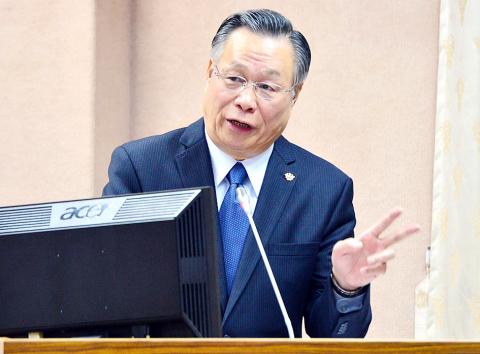The top hierarchy at the Ministry of National Defense is undergoing a big shake-up, with President Ma Ying-jeou (馬英九) said to be closely involved in the changes and promotions at the highest levels of the nation’s armed forces.
Local media reports said that Minister of National Defense Yen Ming (嚴明) has already tendered his resignation to the president, with his post likely to be filled by Chief of General Staff Admiral Kao Kuang-chi (高廣圻).
Kao had previously served as deputy minister of defense, and his post is expected to be filled by Army Commander General Yen Teh-fa (嚴德發).

Photo: Wang Yi-sung, Taipei Times
Deputy Minister of National Defense General Chiu Kuo-cheng (邱國正) is expected to take over the post of army commander.
According to the Chinese-
language United Evening News and online news agency Storm Media, while Yen Ming has tendered his resignation, the president has urged him to stay on for the time being. However, if he sticks to his decision to leave, top hierarchy changes at the ministry could be imminent — as early as within the next few weeks.
Military sources said that Ma had asked Yen Ming to remain in his post at least until the end of March, when Kao is scheduled to retire from active service in the navy and would then be ready to take over as head of the defense ministry.
Rumors of Yen Ming’s possible resignation were rife among senior military officials over the past two weeks. His resignation and subsequent personnel appointments are widely perceived to be calculated moves by Ma to retain control over the armed forces by installing men from his personal sphere of influence into senior posts.
Kao is the younger brother of Kao Lang (高朗), who was a top aide to Ma and had served as Presidential Office deputy secretary-general.
Other likely forthcoming appointments to senior ministry positions were reportedly men who had gained the president’s personal trust and were selected by Ma, in a bid by the highly unpopular, lame-duck president to continue influencing policies and decisionmaking in the military.
The government issued a public statement on Dec. 30 denying that Yen Ming had tendered his resignation.
The ministry also released a statement yesterday saying that the latest reports about Yen Ming’s position were speculation and had no factual basis.
However, political pundits said the government’s denial is a stalling tactic to keep media from reporting on the matter and to prevent the public from being informed on behind-the-scenes political machinations by Ma.

People can preregister to receive their NT$10,000 (US$325) cash distributed from the central government on Nov. 5 after President William Lai (賴清德) yesterday signed the Special Budget for Strengthening Economic, Social and National Security Resilience, the Executive Yuan told a news conference last night. The special budget, passed by the Legislative Yuan on Friday last week with a cash handout budget of NT$236 billion, was officially submitted to the Executive Yuan and the Presidential Office yesterday afternoon. People can register through the official Web site at https://10000.gov.tw to have the funds deposited into their bank accounts, withdraw the funds at automated teller

PEACE AND STABILITY: Maintaining the cross-strait ‘status quo’ has long been the government’s position, the Ministry of Foreign Affairs said Taiwan is committed to maintaining the cross-strait “status quo” and seeks no escalation of tensions, the Ministry of Foreign Affairs (MOFA) said yesterday, rebutting a Time magazine opinion piece that described President William Lai (賴清德) as a “reckless leader.” The article, titled “The US Must Beware of Taiwan’s Reckless Leader,” was written by Lyle Goldstein, director of the Asia Program at the Washington-based Defense Priorities think tank. Goldstein wrote that Taiwan is “the world’s most dangerous flashpoint” amid ongoing conflicts in the Middle East and Russia’s invasion of Ukraine. He said that the situation in the Taiwan Strait has become less stable

CONCESSION: A Shin Kong official said that the firm was ‘willing to contribute’ to the nation, as the move would enable Nvidia Crop to build its headquarters in Taiwan Shin Kong Life Insurance Co (新光人壽) yesterday said it would relinquish land-use rights, or known as surface rights, for two plots in Taipei’s Beitou District (北投), paving the way for Nvidia Corp to expand its office footprint in Taiwan. The insurer said it made the decision “in the interest of the nation’s greater good” and would not seek compensation from taxpayers for potential future losses, calling the move a gesture to resolve a months-long impasse among the insurer, the Taipei City Government and the US chip giant. “The decision was made on the condition that the Taipei City Government reimburses the related

FRESH LOOK: A committee would gather expert and public input on the themes and visual motifs that would appear on the notes, the central bank governor said The central bank has launched a comprehensive redesign of New Taiwan dollar banknotes to enhance anti-counterfeiting measures, improve accessibility and align the bills with global sustainability standards, Governor Yang Chin-long (楊金龍) told a meeting of the legislature’s Finance Committee yesterday. The overhaul would affect all five denominations — NT$100, NT$200, NT$500, NT$1,000 and NT$2,000 notes — but not coins, Yang said. It would be the first major update to the banknotes in 24 years, as the current series, introduced in 2001, has remained in circulation amid rapid advances in printing technology and security standards. “Updating the notes is essential to safeguard the integrity